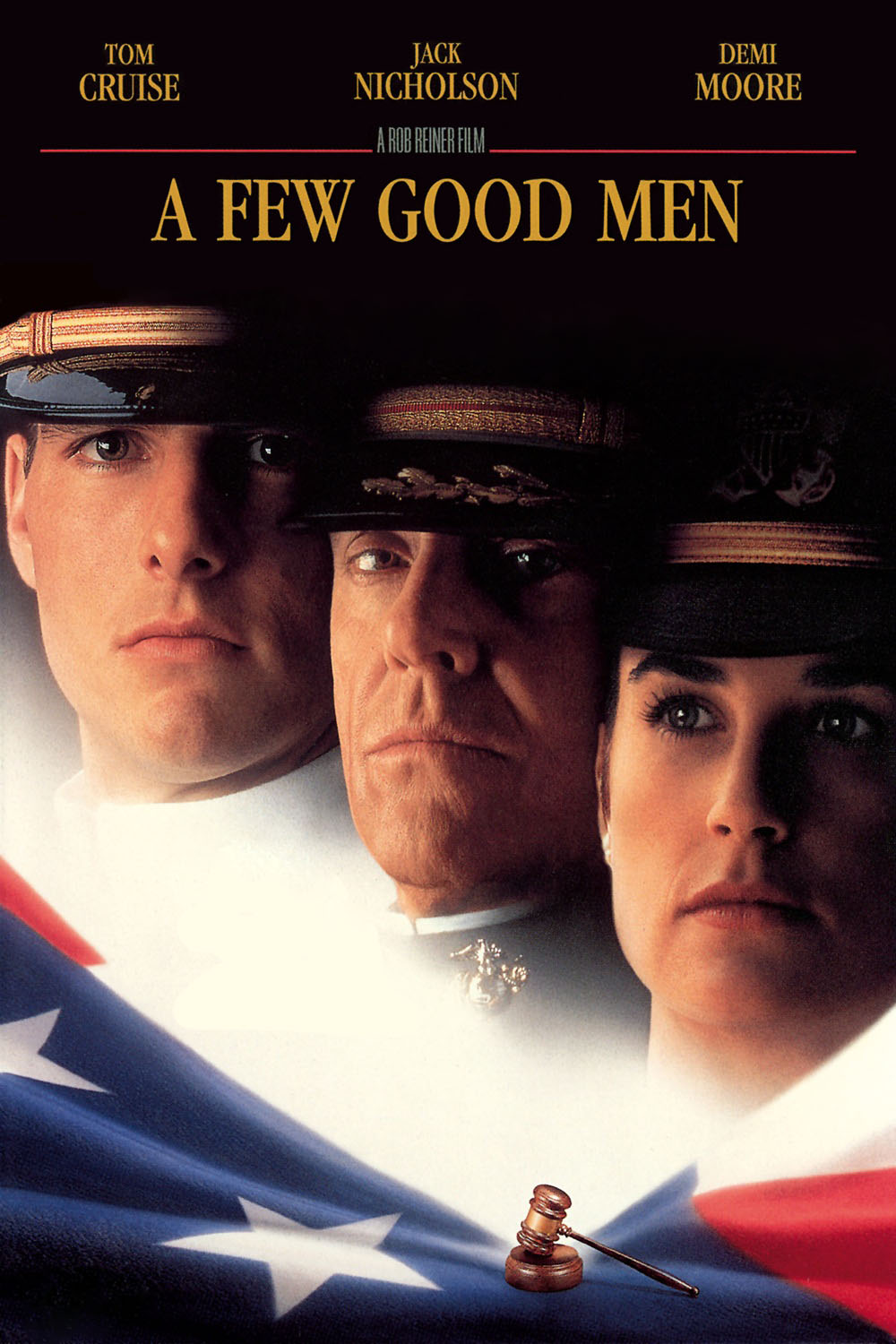Have you ever found yourself questioning the lines of authority, wondering where duty ends and morality begins? If so, you’re not alone. “A Few Good Men,” the 1992 courtroom drama, delves into these complex questions, leaving audiences with a lingering sense of unease and a powerful message about the consequences of blind obedience. The film, based on the play of the same name, has become a timeless classic, resonating with audiences across generations. But what makes “A Few Good Men” so compelling? What are the lessons we can learn from its gripping narrative and unforgettable characters?

Image: moviesjet.club
The film’s central plot revolves around the mysterious death of Private Santiago, a young recruit at Guantanamo Bay Naval Base. Two military lawyers, Lieutenant Daniel Kaffee (Tom Cruise) and Lieutenant Commander Joanne Galloway (Demi Moore), are tasked with defending the accused, Private Dawson and Private Downey, in a seemingly straightforward case of neglect. However, as the investigation progresses, Kaffee uncovers a deeper truth – a calculated act of brutality disguised within the confines of a military code. The narrative unravels the delicate balance between loyalty to superiors and the universal principles of justice, forcing audiences to confront the complexities of navigating these often conflicting ideologies.
The Power of Truth: Unveiling the Code Red
“A Few Good Men” transcends the typical courtroom drama by delving into the harsh realities of military justice and the often unquestioned authority figures within its ranks. The film’s strength lies in its exploration of the human cost of blindly following orders. The pivotal “Code Red” scene embodies the film’s core message, showcasing the brutality and deception that underpin the military’s system of discipline.
The scene, where Kaffee confronts Colonel Nathan Jessup (Jack Nicholson), the commanding officer of the base, forces audiences to grapple with the ethical implications of “following orders.” Jessup, a formidable figure who holds unwavering belief in his convictions, defends the Code Red as a necessary disciplinary tool, arguing that it preserves order and instills discipline within the ranks. Kaffee, however, challenges this notion, exposing the inherent dangers of unchecked power and the potential for abuse that arises when authority overrides compassion and accountability.
The Value of Dissent: Challenging the Status Quo
Beyond the compelling courtroom battles and nuanced character development, “A Few Good Men” champions the importance of dissent and the courage to question established systems. Kaffee, initially portrayed as a carefree, indifferent lawyer, undergoes a gradual transformation throughout the film. Initially dismissing the case as a routine legal matter, he becomes driven by a sense of justice and moral obligation.
Kaffee’s transformation is fueled by his unwavering belief in the power of truth and his willingness to challenge the accepted narrative. He exposes the hypocrisy of the military’s justice system, demonstrating the potential for abuse within a system that prioritizes obedience above all else. His actions, though risky and challenging, embody the courage to stand up for what is right, regardless of the consequences.
The Price of Justice: A Search for Accountability
The film’s compelling narrative does not shy away from exploring the profound consequences of upholding justice. While Kaffee’s pursuit of truth ultimately leads to the revelation of the Code Red and its chilling implications, it also exposes the inherent flaws within the system itself. The trial reveals the stark reality of the military’s ingrained power dynamics, where the pursuit of justice often necessitates navigating complex legal and ethical hurdles.
Through the trial, “A Few Good Men” compels audiences to confront the unsettling reality that even those who seek to uphold justice can become trapped within a system that prioritizes power and control. The film’s ending, though seemingly ambiguous, leaves an indelible mark on viewers, prompting reflection about the complexities of justice and the sacrifices that often accompany its pursuit.

Image: dissectingtheframe.wordpress.com
The Lasting Legacy: A Catalyst for Conversation
The film’s enduring legacy rests not merely on its gripping narrative but also on its capacity to provoke conversations about the nature of justice, authority, and the importance of dissenting voices. It continues to resonate with audiences today, prompting reflection on the ever-present struggle between power and accountability, loyalty and conscience.
“A Few Good Men” stands as a timeless reminder that even in the face of immense pressure, upholding ethical principles and challenging the status quo is essential for a just society. The film serves as an enduring testament to the enduring struggle for justice and the moral courage required to navigate the complexities of truth and authority.
Beyond the Movie: Real-World Echoes
“A Few Good Men” transcends the realm of fiction, offering a stark reflection of real-world events and the ongoing debate surrounding military justice and human rights. The film’s portrayal of abuse within the US military resonates with actual accounts of misconduct and the enduring struggle for accountability within institutions with ingrained hierarchies.
The film’s themes of obedience, dissent, and the search for truth have become increasingly relevant as societies grapple with the complexities of navigating emerging technologies, evolving power dynamics, and the ever-present struggle for justice. “A Few Good Men” serves as a potent reminder that questioning authority, upholding ethical principles, and seeking accountability are vital in ensuring a just and equitable society.
The Movie A Few Good Men
Concluding Thoughts: The Enduring Power of “A Few Good Men”
Beyond its gripping courtroom drama, “A Few Good Men” stands as an enduring testament to the complexities of human nature and the enduring power of ethical principles. This film, through its captivating characters and narrative, serves as a catalyst for conversations about human rights, justice, and the importance of confronting the abuse of power. By exploring the nuances of authority and challenging the blind adherence to a system, “A Few Good Men” ultimately reminds us that the pursuit of justice is an unending journey, demanding constant vigilance and courage in the face of adversity. So, the next time you find yourself confronted with a moral dilemma, remember the words of Daniel Kaffee, “You want the truth? You can’t handle the truth!”






